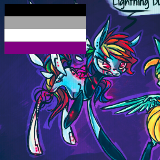Reflections upon singing behind curtains · 1:43am Feb 19th, 2014
I think I can reasonably assume that I am not the only one to see parallels between myself and Fluttershy in the latest episode (or in general, but that's a different topic). Plenty of people fear to expose themselves by sharing the products of their creativity, talents, or lack thereof (I kid, I'd never dream of saying that about anybody but myself). Many people initially stumble or are forced into something that they turn out to quite enjoy, and that does include people who had to be pushed because they were afraid to take the step themselves. It's a fear easier to face when shielded by anonymity. And sometimes, it is a fear easier to face by putting on a different persona in one way or another. All of these describe Saturday's episode, and all of these are commonly seen on the internet. It may well be that we are, as a whole, a culture of people singing behind curtains.
But how well does that really fit? Anonymity is not the same beast it used to be. Or, more specifically, partial anonymity has changed. For full anonymity, where nothing you do can be associated with you or with anything else you do, is simple and clear. If you can create something with no identifiers on it, you can have it, and the ability to avoid identifiers has long kept pace in most areas with the ability to find them. Holding to it may be inconvenient and force a certain amount of subterfuge, but it's generally perfectly achievable. But full anonymity is boring; there's only so much you can do when every creation must stand alone.
Thus, we mostly choose partial anonymity: to have our works linked together when, and only when, we want them to be. We choose pseudonyms, and avatars, and then we choose if we ever want to have our real names and faces associated with them. We make multiple accounts to create separate personae, or use the same names on multiple sites to link personae together. And we take for granted that these ruses, to the extent we choose to support them in our actions as we wear them, are secure both from penetration and imitation. But how would one even go about achieving these things in a practical manner without modern technology? Partial anonymity requires that you be able to prove your identity without proving what that identity is. That's easy with public-key cryptography, or servers that can recognize your password without any possibility of giving away that password (except through extreme brute-force attacks or flaws in the system), or other sorts of modern black magic. But what do you do without them? Anything that you cannot change does not allow multiple identities; anything you can change admits the possibility of imitation. And it wasn't until the 1970s that we started to think about how to get guarantees about how hard that imitation actually is.
So I pose to you the question: how much has society been changed by the ability to easily sing behind as many curtains as you like with no threat of being impersonated?
And another point that comes up: I spoke in the beginning of creating personae. I referred throughout my discussion of partial anonymity to the fundamental importance of whether you can maintain more than one. But what is a persona?
Well, the easy answer is that it is the face you draw on the curtains before you invite the audience in. But that doesn't really do the concept justice. A persona is the sum total of everything that can be concluded on the basis of some set of things that can be linked to a common creator. As such, it is by nature a complex and ever-changing thing, very unlike a simple two-dimensional drawing. We might say that a persona is a person, but not necessarily one who was born so much as made. That has a certain appeal to it as a definition.
But that only captures what it looks like from the front; what about when you look at it from behind the curtains? Perhaps it is simply you, in everything but name. Then it is straightforward. But perhaps you have chosen to edit out some parts of yourself, or add some things in, or fabricate a costume out of whole cloth. Is it then a lie? But what of when you mess up? If I intend my persona to be American, but on rare occasions I speak of "colour" or "favourites" or the like, then that too is part of my persona. Thus my persona is not what I have intended it to be, but rather what it has become through the natural interactions of my intentions, my limitations, and whatever scrutiny others may choose to bring to bear. Can such an organic entity be called a "lie"? On the other hand, you may intend to represent yourself as you are in person accurately, but be foiled in that by the limitations of communicating only in text, or only in disjointed chunks, or only in one location, or only on one topic. Can the result fully be called the "truth"?
I mean, I don't know about your various identities, but I can tell you that I find Borg and [NAME REDACTED] to be in some ways very different people, sometimes even with incompatible goals, though neither is any less true than the other. I have never been certain what level of truth that actually is. I don't know that I would want to know, even if I could.
So here I ask: What does it mean to display an identity, and what does it mean for identities to be "real" or "faked"?
Tl;dr: Read the last line before each of the line breaks, I suppose.


